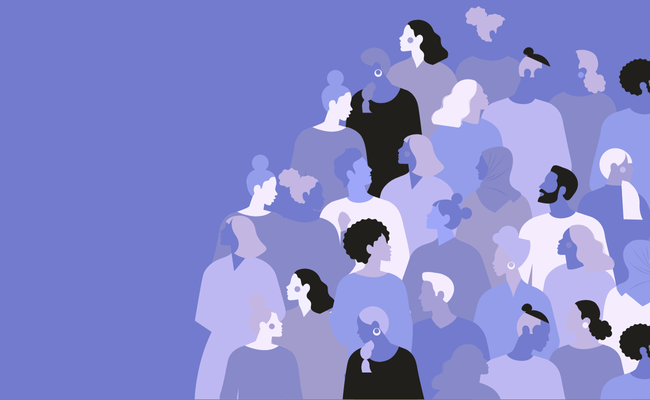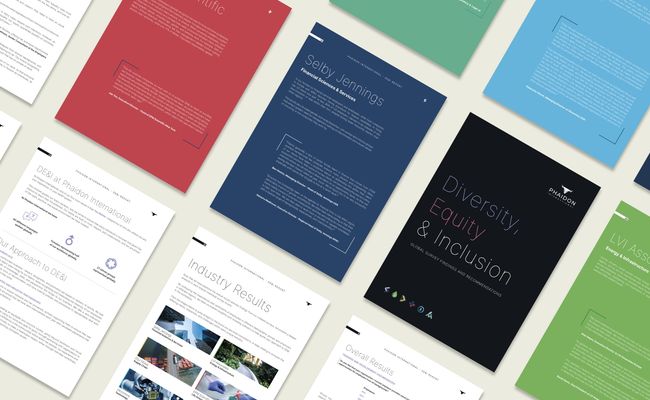At Phaidon International, we are passionate about nurturing the next generation of talent in our business. The majority of our current leadership started out at entry level with us, so we know that our youngest employees will be our leaders of tomorrow. Monthly, we host Tea and Talk, a series of panel discussions, workshops and informal drop-ins for our employees on the ground floor to learn directly from our more senior people.
On International Women's Day, we ran a special edition of Tea and Talk to engage our staff with all things #BalanceforBetter. Collectively, our panel have a wealth of experience from the recruitment industry. Cara, Clare, Dawn, Gail and Jack shared their personal challenges and experiences, how they think the industry has changed to be more gender balanced in recent years, and what we can all do to drive diversity and inclusion.
ZACH STAMP: One thing we want to try and do is learn a lot more from each other. Today’s subject is genuinely important and something that I’m quite passionate about. Someone asked me earlier, “Why are you here? You’re not a girl.” [Laughs] Thanks for spotting that. The reason is balance. Today – and I think that’s reflected very well in this year’s campaign – is not just about gender diversity and it’s not just a woman’s issue. We’re a diverse business, with diverse thought groups and diverse talent – and we’re so much better for that. For those who don’t know me, I’ve been here about ten years. I’ve seen quite a lot of change, huge amounts of growth. A cultural shift. One of the important things to highlight to you – about three and a half years ago, we hired someone called Bethan Williams. Many of you will know her. Bethan was one of six women on the London Sales floor. Today, we have a workforce that is approaching 40% female. That is a remarkable achievement and turn around from what was essentially a lad’s club. It was not productive. We missed out because of that. Without further ado, let’s get to answering the questions from our audience. I’ll let our panel introduce themselves starting with you, Jack.
JACK TRUDEAU: My name’s Jack. I work in the New York office. I’ve been at Phaidon through the, er, [laughs] bad stuff Zach was talking about.
GAIL BROWN: I’m Gail. I’m the Group Compliance Director and I’ve been here for five and half years now.
DAWN HAMPTON: My name’s Dawn. I’ve been at Phaidon for seven years. I’ve been doing Contracts recruitment for eighteen years. I’m probably one of the first external people that we hired, actually. Opposed to the majority of the business that have started out as graduates and progressed upwards.
CLARE COOPER: Hi, I’m Clare. I’ve been here for nearly ten years. It’s my anniversary on Thursday! I’ll have to throw a party. Yeah, I joined with Zach, and he was right – there were hardly any women. But we managed to be the top billers for years and years and years. So, I’ve spent the last couple of years in the States, a couple of years in New York and San Francisco. It’s awesome to be back in London and to see how many women there are now.
CARA MYERS: Hey, I’m Cara and I’m the Group Director for Talent Acquisition. So, I just hit my sixth anniversary here at Phaidon International last week. I started out as an entry level grad.
Clare Cooper and Cara Myers laugh during Tea and Talk
ZACH STAMP: Awesome, so let’s get going. Which of our clients do you think execute Diversity and Inclusion initiatives well? Clare –?
CLARE COOPER: Erm, actually [pauses] I don’t think any of them do it brilliantly. Some of them do it better than others. Banks have had a bit of a head start, driving it in recent years. But no one springs to mind as doing it amazingly. But that’s the whole point. That’s why we’re in such a strong position to help them. We can use that to our advantage. I met a client a few weeks ago and they do something which I think is pretty cool. They celebrate every kind of nationality within the company, so all their national holidays.
JACK TRUDEAU: A lot of our clients are asking the same thing. “What can we be doing better? Who does this well?” I’ve found that the best traits companies do is to have female representation on the interview panel. Coaching through potential female candidates, “This is what we do. This is why we’re good. I’ve achieved this.” And basically, helping them through the process. A lot of the time, people tend to be more reactive. They realise they have no female leaders, we need to hire some. But at that point it’s already too late. We advise our clients, when they come across top female talent, they should make the position available then. If they think the position might come available in six months’ time, they might as well hire now, instead of scrambling to find someone later on and thinking, “We should have had this sorted last week.”
CARA MYERS: I went to an in-house recruitment expert last week. They gave a talk about Jaguar and L’Oreal. So, Jaguar don’t struggle to get, in their own words, “white men” to apply to their business and L’Oreal find it really easy to get women to join theirs. But both companies struggle with the other half. So, they’ve actually held recruitment events, together. They each bring in their regular candidates, so it’s much more of a mixer. That way they have access to different talent pools they wouldn’t usually get applications from.
CLARE COOPER: That’s so cool. There’s also a trend, more so probably in the States than here, that companies have Heads of Diversity and Inclusion now. But that wasn’t a thing five years ago. But now lots of companies have huge teams dedicated to driving diversity and I think we’ll see that more in London and the UK.








